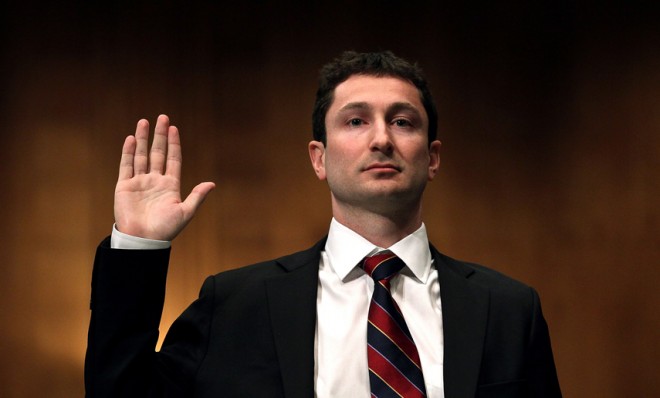'Fabulous Fab' goes to court: The story behind the fall of a former Goldman Sachs trader
Fabrice Tourre has become the human face of the collateralized debt obligation

A free daily email with the biggest news stories of the day – and the best features from TheWeek.com
You are now subscribed
Your newsletter sign-up was successful
This week, Fabrice "Fabulous Fab" Tourre, a 34-year-old ex-Goldman Sachs banker, headed to a federal court in downtown Manhattan to defend himself against charges brought by the Securities and Exchange Commission, which alleges that Tourre in 2007 defrauded his clients using the type of securities that helped cause the 2008 financial crack-up.
In opening arguments, the SEC's lawyer said that the case is about "Wall Street greed," and that the SEC will prove that Tourre hid key investment information from his clients. Tourre's lawyers contend that he did nothing wrong, and that his clients — sophisticated institutional traders, not individual investors — knew exactly what they were doing.
Here are some of the key points:
The Week
Escape your echo chamber. Get the facts behind the news, plus analysis from multiple perspectives.

Sign up for The Week's Free Newsletters
From our morning news briefing to a weekly Good News Newsletter, get the best of The Week delivered directly to your inbox.
From our morning news briefing to a weekly Good News Newsletter, get the best of The Week delivered directly to your inbox.
Who is Fabrice Tourre?
Tourre, just 28 at the time of his alleged crime, was something of a rising star at Goldman Sachs.
After graduating from France's top engineering school, the École Centrale Paris, Tourre earned his master's degree in management science and engineering at Stanford, and, after a summer internship, was hired by Goldman Sachs. He quickly landed in the mortgage department, where he built CDOs — collateralized debt obligations, which, as you probably remember, are the financial weapons of mass destruction that nearly blew up the entire banking system.
How did the SEC nab him?
A free daily email with the biggest news stories of the day – and the best features from TheWeek.com
In the aftermath of the crisis, the SEC obtained Tourre's emails — a colorfully frank stack of correspondence strewn with exclamation points. Tourre was the only individual named in the government's case against Goldman Sachs, and is going to trial alone, because Goldman settled with the SEC in 2010 for $550 million.
Why do people call him "Fabulous Fab"?
It's a nickname Tourre rather embarrassingly used for himself in one of those emails.
"The whole building is about to collapse anytime now," Tourre wrote on Jan. 23, 2007, according to SEC documents. "Only potential survivor, the fabulous Fab... standing in the middle of all these complex, highly leveraged, exotic trades he created without necessarily understanding all of the implications of those moustruosities [sic]!!!"
What is the SEC trying to prove?
The investment Tourre helped create, the Abacus 2007-AC1, was what's known as a synthetic CDO — meaning it was built through an insurance contract that allows clients to bet for or against its success. The SEC is accusing Tourre of encouraging clients to bet on the underlying mortgage assets, while concealing a relevant fact: John A. Paulson's hedge fund, which helped construct the deal, was betting against them. When the mortgage market cracked up, those who bet in favor lost more than $1 billion.
What evidence will the SEC use?
The SEC is relying heavily on Tourre's emails, including the one in which he refers to himself as "fabulous Fab." The Wall Street Journal says, "The regulator claims the emails are pivotal in establishing Mr. Tourre's state of mind ahead of the transaction.
How will Tourre defend himself?
In her opening arguments, Tourre's lawyer, Pamela Chepiga, argued that Tourre did not mislead investors or ACA Capital Holdings, the third-party firm brought in to select the securities included in Abacus.
"ACA, not Paulson, picked the securities tied to Abacus, she said, adding that ACA rejected dozens of securities that Paulson wanted included and ran a sophisticated computer analysis before signing off on them," reports the Huffington Post.
When it comes to Tourre's character, which will most certainly come under attack, Tourre's lawyers "could try to portray their client as a bit player in the crisis — a midlevel 28-year-old trader at the time of his actions — who has dedicated his time since Goldman to worthy causes and a life of the mind," says the New York Times.
Tourre has spent the last couple years volunteering in Rwanda and at a doctoral economics program at the University of Chicago, where professors call him a "standout."
Carmel Lobello is the business editor at TheWeek.com. Previously, she was an editor at DeathandTaxesMag.com.
-
 The environmental cost of GLP-1s
The environmental cost of GLP-1sThe explainer Producing the drugs is a dirty process
-
 Greenland’s capital becomes ground zero for the country’s diplomatic straits
Greenland’s capital becomes ground zero for the country’s diplomatic straitsIN THE SPOTLIGHT A flurry of new consular activity in Nuuk shows how important Greenland has become to Europeans’ anxiety about American imperialism
-
 ‘This is something that happens all too often’
‘This is something that happens all too often’Instant Opinion Opinion, comment and editorials of the day